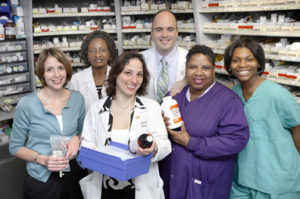Pharmacotherapist: Education and Career Information
A pharmacotherapist is almost always a pharmacist who is highly trained in the treatment of disease with medications. This medical professional goes beyond diagnosis and following standardize protocols. Pharmacotherapists recommend the best treatments for a patient’s disease state. They work on a multidisciplinary team, which includes other medical professionals like respiratory therapists, nurses and doctors. With their specialized training in pharmacotherapy, pharmacotherapists ensure that the team makes the best decisions regarding medications, so that the patient has the best possible income. Often, these healthcare professionals make clinical observations and incorporates them with information gained from other healthcare providers to optimize therapeutic decisions.
The Salary of a Pharmacotherapist and Skills Required
The salary of a pharmacotherapist ranges from $106,000 to $130,000. Pharmacotherapy is a certification that commands a higher salary, more promotions and more recognition. There are many skills required to be a successful pharmacotherapist. Pharmacotherapists acquire their skills through advanced training in biomedical, clinical sciences and practical experience. They must have sound judgment in the collection, implementation and application of patient-specific data to assist with therapeutic regimens. Pharmacotherapists must possess the skills to:
•Collaborate with other healthcare professionals regarding drug selection, monitoring and dosing
•Participate in the planning of patient treatment
•Investigate therapeutic alternatives
•Review patient records
•Evaluate patients through physical assessment, present medical condition and response to therapy
•Interpret lab data
•Answer therapeutic questions from doctors
•Identify drug complications
•Utilize available state-of-the-art technology to improve and monitor drug therapy
Internship Requirements for Pharmacotherapist
Admission to a pharmacotherapy internship includes completion of ACPE-accredited Pharm. D. program, current curriculum vitae, onsite interview and registration and participation in a resident matching program. Students must participate in advanced pharmacy practice experiences, which is typically in a variety of practice settings for six to nine weeks with rotation types that include ambulatory care, cardiac care, pediatrics, hospital system pharmacy, medication therapy management and other electives. Students have the option to choose electives in their area of interest. Interns work closely with experienced preceptors specific to each clinical rotation experience. Research is also a critical component of the pharmacotherapy residency training, and residents are typically responsible for development, implementation and completion of an independent research project.
Educational Requirements for Pharmacotherapy
Students at the high school level interested in this field are encouraged to take coursework in biochemistry, physiology and chemistry. Students entering a pharmacotherapy program are required to have a baccalaureate degree in a discipline, such as biochemistry, pharmacy, chemistry or a biological science. This training should include coursework in calculus, physiology, biology, organic chemistry and biochemistry.
Pharmacotherapy programs at colleges are basically a two-year master’s program. It is designed to prepare pharmacists for the practice of a pharmacotherapy specialist. Clinical skills are refined across all areas of pharmacotherapy. These programs prepare students to sit for board certification.
Training experience in the pharmacotherapy program includes completion of a clinical research project and completion of a drug utilization evaluation. Core rotations may include internal medicine, emergency medicine, infectious diseases and pain management. Elective rotations may include Cardiac critical care (CCU), clinical practice management drug policies and hematologic malignancies. Upon completion of the program, students are prepared to serve patients, providers, and institutions as an authoritative resource on pharmacotherapy matters and as a pharmacy clinical specialist in an academic or community hospital or clinical faculty at a university or college.
The Future of Pharmacotherapy
The positive outcomes of pharmacotherapy training for pharmacists is increasingly recognized within the pharmacy industry, including development of practice and problem-solving skills, improved employment opportunities, exposure to the many levels of pharmacy practice, professional networking, exploration and development of new roles for pharmacists, and experience in the education of pharmacy residents. The overall impact of postgraduate pharmacy education and training in pharmacotherapy is well documented. For example, progressive clinical services in hospitals and other healthcare settings are found to be implemented more often if the director of pharmacy has an advanced degree in pharmacotherapy.
The Pharmacy Manpower Project report suggests the following numbers of pharmacists will be needed in the United States by the year 2020:
• 100,000 for order fulfillment. We consider these pharmacists to be those who are not involved in direct patient care, but who oversee and participate in the drug distribution process, including oversight of technicians and automated dispensing systems. These pharmacists would be charged with ensuring the safety of the drug dispensing process. They may be required to have system engineering backgrounds as well as pharmacy skills.
• 165,000 pharmacists who provide primary care services. We envision that these individuals would practice in community pharmacies and other ambulatory care settings.
• 130,000 pharmacists who provide secondary and tertiary care services. We anticipate that these individuals will practice in hospitals and higher intensity ambulatory settings (e.g., referral clinics in tertiary care centers).
• 22,000 pharmacists for non–patient-related activities (i.e., pharmacists in management, pharmaceutical industry, and other positions).
There is disparity in the numbers of pharmacotherapy residency programs in states and regions. In addition, a huge variability exists in the numbers of pharmacotherapy students per state and region. These differences will need to be addressed in the future to ensure that all states benefit from the advances in practice that can occur by the employment of residency-trained pharmacotherapy students.
Pharmacotherapy is used for a wide variety of medical conditions, including diabetes, alcoholism, obesity, heart disease and cancer. It is a field that is relatively new and continues to progress. Society’s expectations of pharmacists have quickly increased. The world needs specialized pharmacists who can manage patient drug therapy in an effective and safe manner. And the need for these specialists will continue to grow no matter what the economic, political or practice climate.
The American College of Clinical Pharmacy (ACCP) has a strong vision for the future of the pharmacy profession that includes pharmacotherapists. They will be overseeing residency training and the preparation of pharmacotherapists for their future roles in the field. This is the agency that will recommend future actions for the profession.






